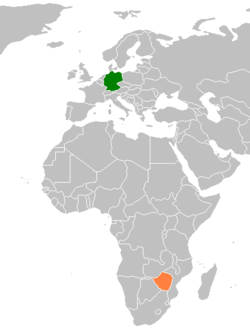 | |
Germany | Zimbabwe |
|---|---|
Germany-Zimbabwe relations are the bilateral relations between the Federal Republic of Germany and Republic of Zimbabwe. Zimbabwe operates an embassy in Berlin [1] and Germany operates an embassy in Harare.
 | |
Germany | Zimbabwe |
|---|---|
Germany-Zimbabwe relations are the bilateral relations between the Federal Republic of Germany and Republic of Zimbabwe. Zimbabwe operates an embassy in Berlin [1] and Germany operates an embassy in Harare.
Relations between the two countries started when Zimbabwe gained independence in 1980. Germany was one of the largest providers of aid to Zimbabwe until the 1990s when Zimbabwe enacted land reforms to redistribute lands from White Zimbabweans, some of whom were German citizens, to the native African population. In 2002, EU imposed sanctions on members of the Zimbabwean African National Union, the dominant political party in Zimbabwe, with Germany's support. Germany froze dozens of bank accounts belonging to Zimbabwean political leaders and refused visas to Zimbabwean nationals.
During the 2007 EU-Africa summit meeting in Lisbon, Chancellor Angela Merkel denounced Robert Mugabe for human rights violations committed by Mugabe's government saying "I appreciate that some African states have tried to solve the crisis in Zimbabwe, but time is running out. The situation of Zimbabwe is damaging the image of the new Africa." [2]
German-Zimbabwean relations thawed in 2009 when Zimbabwean Prime Minister Tsvangirai visited Germany to discuss easing sanctions on Zimbabwe. In 2010, Zimbabwe seized land belonging to Heinrich Von Pezold, a German National, which directly violated the terms of a investment agreement between Germany and Zimbabwe. [3] In 2012, German Minister for Economic Development Dirk Niebel travelled to Zimbabwe to discuss aid, easing sanctions and opening Zimbabwe's market to German businesses. The EU lifted sanctions on Zimbabwe's political leaders and allowed visas to Europe later that year. [4]
After the 2017 Zimbabwean coup d'état, Germany's development minister Gurd Mueller visited Zimbabwe to discuss bringing aid and economic development if President Mnangagwa agreed to political and economic reforms to build democratic structures in Zimbabwe and correct human right violations that happened under Mugabe. [5]
In 2021, Germany provided 3 Million Euros to a United Nationals World Food Programme project for Zimbabwe. [6]
By 1998, Germany funded German teaching courses at the University of Zimbabwe and fund a Goethe-Zentrum in Harare. [7]
In 2022, Germany exported US$49 worth of goods to Zimbabwe with the most common export being Washing Machines. [8] In 2019, Zimbabwe exported US$51 billion worth of goods to Germany, with the most common export being Tobacco. [9]

The Byelorussian SSR was one of only two Soviet republics to be separate members of the United Nations. Both republics and the Soviet Union joined the UN when the organization was founded in 1945.

Zimbabwe maintains relations with various countries around the world, and maintains close diplomatic relations with neighboring nations.
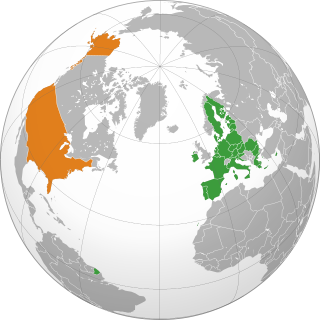
Relations between the European Union and the United States began in 1953, when US diplomats visited the European Coal and Steel Community in addition to the national governments of its six founding countries. The two parties share a good relationship which is strengthened by NATO, cooperation on trade, and shared values.
The following lists events that happened during 2007 in Zimbabwe.
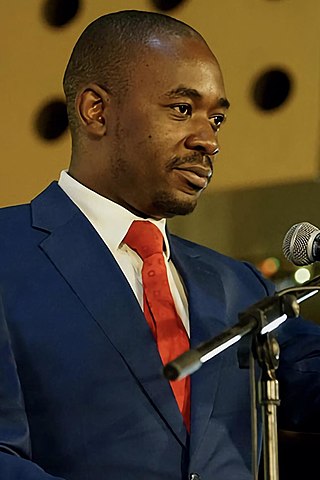
Nelson Chamisa is a Zimbabwean politician and the former President of the Citizens Coalition For Change. He served as Member of the House of Assembly of Zimbabwe for Kuwadzana East, Harare. Chamisa was the MDC Alliance's candidate for president in the 2018 general election, having previously been the leader of the party's youth assembly. He was the Presidential candidate for the Citizens Coalition for Change in the 2023 Zimbabwean Presidential election. He has served as the former chairperson of national youth for the same party as well as the Secretary for Information and Publicity for the opposition party Movement for Democratic Change (MDC). In 2003, at the age of 25, Chamisa became the youngest Member of Parliament. Chamisa was also the youngest cabinet minister in Government of National Unity of Zimbabwe in 2009.

China and Zimbabwe have had a close, but chequered, relationship since the latter's independence. China has an embassy in Harare. Zimbabwe has an embassy in Beijing and a consulate-general in Hong Kong.

United States–Zimbabwe relations are bilateral relations between Zimbabwe and the United States. Both countries share a common history and language as former British colonies.

Greece has an embassy in Berlin and five General Consulates in Hamburg, Munich, Düsseldorf, Stuttgart and Frankfurt. Germany has an embassy in Athens and a General Consulate in Thessaloniki. Both countries are full members of the Organization for Security and Co-operation in Europe, Organisation for Economic Co-operation and Development, European Union, NATO, and the Eurozone.
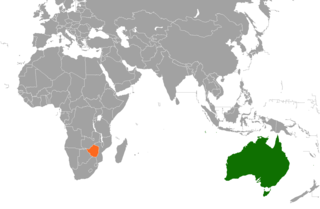
Foreign relations exist between Australia and Zimbabwe. Both countries have full embassy level diplomatic relations. Australia maintains an embassy in Harare, and Zimbabwe maintains an embassy in Canberra.

Greece-Zimbabwe relations are the bilateral relations between Greece and Zimbabwe. Greece has an embassy in Harare. Due to the economic situation, Zimbabwe has neither an embassy nor an honorary consulate in Greece.

Russia – Zimbabwe relations date back to the mid-1960s, during the Rhodesian Bush War. The Soviet Union supported Joshua Nkomo's Zimbabwe African People's Union, and supplied them with arms; Robert Mugabe's attempts to gain Soviet support for his Zimbabwe African National Union were rebuffed, leading him to enter into relations with Soviet rival Beijing. Throughout the 1980s Zimbabwean relations with the USSR were notoriously cold. Mugabe "stonewalled" the Soviets "for ten months" rather than establish relations with them while he was establishing relations with other countries including the United Kingdom and the United States. The agreement the Soviets were forced to agree to demanded they meet strict criteria about how they could operate in Zimbabwe, while no other country had to agree to similar concessions before establishing relations. The agreement was described as "embarrassing and humiliating for the Soviets since it singles them out." Mugabe shunned Soviet help and allowed British military bases to be established in Zimbabwe against protests from Moscow. Mugabe also accepted the help of British military advisers and declined the same offers from the Soviet Union. Several American-made movies were aired in Zimbabwean movie theaters in the 1980s that the Soviets believed constituted "anti-Soviet propaganda," including the movies Invasion U.S.A., Red Dawn, Firefox, Rocky IV, Rambo: First Blood Part II, Water, The Living Daylights, The Whistle Blower, and Rambo III. The Soviet embassy officially protested, however, they were allegedly told by Mugabe "to complain to your ZIPRA friends." However, since the 2000s Robert Mugabe had strengthened his relations with both Beijing and Moscow as a result of intense western pressure on him. Zimbabwe was one of the few countries that voted with Russia on United Nations General Assembly Resolution 68/262 about the annexation of Crimea. Russia maintains strong economic and political ties with Zimbabwe. Russia still maintains an embassy in Harare. Both Russia and China still maintain strong economic and political ties with Zimbabwe and both countries had vetoed the UN resolution imposing UN sanctions on Zimbabwe which was proposed by both the US and the UK on July 12, 2008.
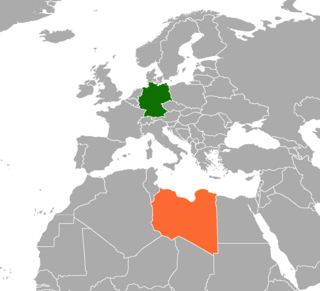
Germany–Libya relations are bilateral relations between the Central European state of Germany and the North African state of Libya. Germany is represented in Libya with an embassy in Tripoli and a diplomatic office in Benghazi, while Libya has an embassy in Berlin. The relationship between these countries was tense in the late 1980s following a bombing incident, but improved since with increasingly close co-operation especially on economic matters. However, during the 2011 Libyan civil war, Germany sided politically with the National Transitional Council, which it recognized as Libya's legitimate government after severing ties with Muammar Gaddafi's regime.

India–Zimbabwe relations are bilateral relations between India and Zimbabwe.

Albania–Germany relations are the bilateral relations between Albania and Germany.

The nations of Mexico and Zimbabwe established diplomatic relations in 1985. Both nations are members of the Group of 15 and the United Nations.

Relations between the UK and Zimbabwe have been complex since the latter's independence in 1980. The territory of modern Zimbabwe had been colonised by the British South Africa Company in 1890, with the Pioneer Column raising the Union Jack over Fort Salisbury and formally establishing company, and by extension, British, rule over the territory. In 1920 Rhodesia, as the land had been called by the company in honour of their founder, Cecil Rhodes, was brought under jurisdiction of the Crown as the colony of Southern Rhodesia. Southern Rhodesia over the decades following its establishment would slowly be populated by large numbers of Europeans emigrants who came to form a considerable diaspora, largely consisting of Britons but also smaller groups of Italians, Greeks and Afrikaners. A settler culture that had already existed since the time of company would come to cement fully and the white population began to identify as Rhodesians, often in conjunction with British/Afrikaner/Southern European identities of their ancestors. Southern Rhodesia would go on to participate heavily in both the First and Second wars, providing soldiers and military equipment to the British war effort.

Turkey has an embassy in Harare. Zimbabwe opened its embassy in Ankara on October 3, 2019.

Germany-Nigeria relations are the bilateral relations between the Federal Republic of Germany and Federal Republic of Nigeria. Nigeria operates a Embassy in Berlin and Germany operates a Embassy in Abuja. Germany has a Consulate-General in Lagos and Nigeria has a Consulate-General in Frankfurt.

Cuba–Germany relations are the bilateral relations between Germany and the Republic of Cuba. Cuba has an embassy in Berlin and Germany has an embassy in Havana.
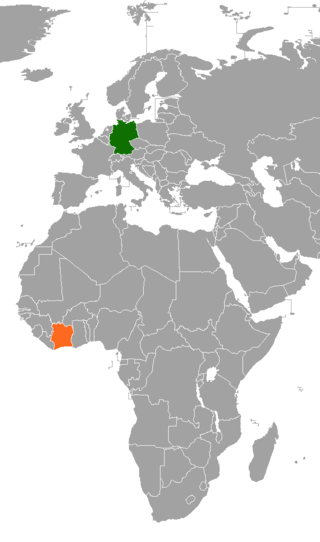
Germany–Ivory Coast relations are described by the German Foreign Office as "traditionally friendly".